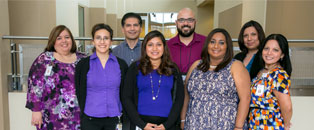Where Health Happens
By Andy Hernandez, Community Development Manager
Health starts in our homes, neighborhoods, workplaces, schools and churches. Health happens where we live, work, play and pray. It happens in the material and social conditions in which we live. These elements combined shape—for better or worse—our well-being and health outcomes.
Social Determinants of Health
How much money do we make? Do we have health insurance or not? What is our level of education? Do we live in a low-income or high-income neighborhood? How safe is our home and workplace? The answers to these questions help explain the health of a community by determining connectedness. These factors determine what opportunities we have to be healthy. This is generally referred to as the, "social determinants of health." They account for over 40 percent of all health outcomes, twice as much as access to medical care (20 percent). Social, environmental and economic factors contribute more heavily to the health and well-being of individuals than anything else.
Where We Live
Methodist Healthcare Ministries of South Texas, Inc.'s (MHM) mission is "Serving Humanity to Honor God" by improving the physical, mental and spiritual health of those least served in the Rio Texas Conference of The United Methodist Church. Overwhelmingly the underserved are the working poor. Simply put, poverty adversely affects your health as does being underemployed, undereducated and uninsured. If we want to create conditions that nurture healthy people, we have to change the social and material conditions that make people and communities unhealthy. This means helping those in need gain access to health care services, obtaining insurance coverage through the health insurance marketplace, help raise education and income levels, and help make their communities safer. Ultimately, it means helping people lift themselves out of poverty.
Healthy Communities
Community engagement and development strategies found in asset-based community development initiatives, youth sports leagues, family-strengthening programs, strengths-based nursing practices, and "upstream" clinical care protocols are linked to improving the social determinants of health. To create healthy environments, you have to develop healthy communities. We all play a part in this process. We are where health happens. We have the power to collectively impact the conditions of our community. My team, the MHM family, does this everyday. How do you play a part in improving the health of your community?







